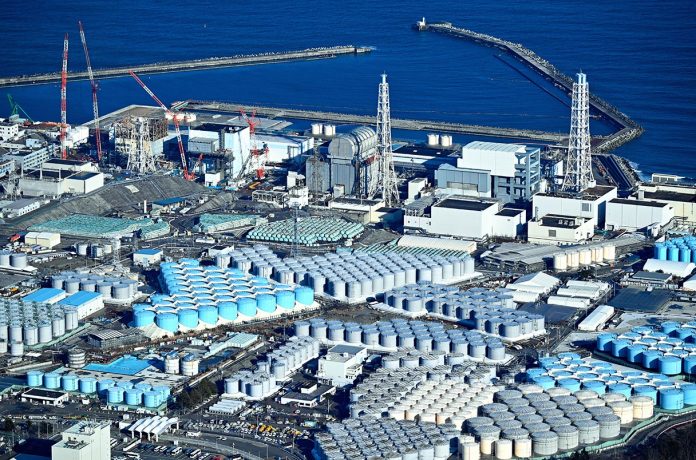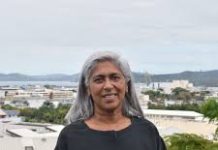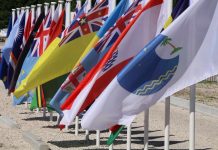
Opinion by Dr Kalinga Seneviratne
International Atomic Energy Agency (IAEA) director general Rafael Mariano Grossi, after travelling to Tokyo earlier this month to present a report endorsing Japan’s approach to discharging Fukushima’s treated nuclear waste water into the Pacific, has been trying to convince Japan’s sceptical Pacific neighbours of the authenticity of the report’s findings.
The IAEA, which has opened the door for Tokyo Electric Power Company (Tepco) to dump about 1.3 million tonnes of contaminated water into the Pacific Ocean, insists the controlled, gradual release would have a “negligible radiological impact on people and the environment”.
But the small island nations of the Pacific remain deeply concerned about Japan’s intention to dump nuclear waste into the ocean. They see this as not merely a nuclear safety issue but a “nuclear legacy issue” – the Pacific has been used as a nuclear weapon testing and dumping site since the end of the second world war.
Grossi has assured that IAEA experts would return to Fukushima repeatedly, for as long as the process takes, to take samples at different locations and confirm the water remains safe. But what happens if the water discharged were found to be unsafe? Won’t it be too late to fix the “scientific” problem then?
IAEA’s recent actions raise questions over whether and how much it respects the viewpoints of the small Pacific nations.
The Pacific Collective on Nuclear Issues, made up of civil society groups and NGOs, has asked Japan to explain its disregard for the findings of the independent Pacific expert panel and why it used the IAEA’s report instead to justify the ocean dumping of nuclear waste. “We do not feel assured by the IAEA’s confidence in the safety of Japan’s proposal as the agency’s remit is promoting the safe use of nuclear energy,” it said.
The collective also slammed what it alleged as Tokyo’s attempt to divide the leaders in the Pacific. It said “we condemn the numerous attempts by Japan to increase its Overseas Development Assistance (ODA) as a means of placating our leaders and buying support for its irresponsible and dangerous plan” – singling out the leaders of Papua New Guinea and Palau.
There is a legacy of nuclear testing in the Pacific and its effects are still felt by islanders today.
The impact is increasingly well documented. In recent years, scientists have found signs of contamination from the 1950s US nuclear weapon testing in the Marshall Islands atoll of Bikini as far as in Guam. Between 1946 and 1970, the US dumped nuclear waste in various sites off the Californian coast. The full extent of the contamination is still being evaluated.
In 1981, a report found that French nuclear testing in their Pacific colonial territory was causing Moruroa to sink and releasing what The New York Times described as “untold amounts of radioactive waste into the sea”.
But such scientific evidence has come too late for the people of the Pacific.
Henry Puna, secretary general of the 18-member Pacific Island Forum, said recently that the safeguarding of the ocean “is not merely a nuclear safety issue; it is rather a nuclear legacy issue”. He argued that “the future of our children and future generations are at stake”.
The 1986 South Pacific Nuclear Free Zone Treaty – or Treaty of Rarotonga – adopted by the Forum specifies that members are “not to dump radioactive wastes and other radioactive matter at sea anywhere within” the treaty zone. Dialogue partner Japan lies very close to the northern borders of the zone: any dumping in its waters could easily flow into the zone.
China, which is promoting what it calls a “development rights” cooperation policy in the South Pacific, has condemned Japan’s discharge plans. China’s ambassador in Fiji, Zhou Jian, has urged the Pacific to speak up, saying “The Pacific is not Japan’s sewer”.
Japan, Australia, India and the US are members of the Quadrilateral Security Dialogue, which claims to protect the rules-based international order. This order should be centred on respecting international treaties such as the Rarotonga Treaty.
Australia, despite signing up to the treaty, and the US have endorsed Japan’s discharge plan. India has been silent, despite promising to highlight Pacific islands’ concerns to the world.
This has given the Chinese a trump card in the geopolitical battle in the Pacific. Japan’s seeming disrespect for the concerns of the Pacific peoples has the potential to rekindle negative feelings over imperial Japan’s behaviour during World War II in Asia and the Pacific.
In 1985, after Japan cancelled plans to dump 10,000 drums of high-level nuclear waste deep into the Pacific, Tokyo reportedly said it “had no intention of dumping radioactive waste in the Pacific Ocean in disregard of the concern expressed by the communities of the region” – a pledge the Pacific Island Forum’s Puna has reminded Japan of.
The Pacific Collective on Nuclear Issues has called upon Pacific leaders to sue Japan at the international tribune of the Law of the Sea. When I asked the Chinese envoy during a Suva press conference if China would be willing to take this up at the UN Security Council, he said China would be willing to look at it if requested to by Pacific island nations.
If China took the issue to the Security Council and the US, along with France and Britain, vetoed a binding resolution to ban Japan’s discharge plan, it would expose the hypocrisy of the West and their allies in protecting the rules-based international order. It would also give China a victory, with Beijing seen as respectful of the concerns of small nations and standing up for them.
Dr Kalinga Seneviratne is a consultant to the journalism programme of the University of the South Pacific
SOURCE: SCMP/PACNEWS

















